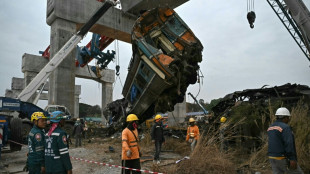
-
 California investigating Grok AI over lewd fake images
California investigating Grok AI over lewd fake images
-
Wales's Faletau set to miss bulk of Six Nations

-
 Denmark, Greenland wrap up crunch White House talks
Denmark, Greenland wrap up crunch White House talks
-
England sweating on Fin Smith's fitness for Six Nations opener

-
 NASA acknowledges record heat but avoids referencing climate change
NASA acknowledges record heat but avoids referencing climate change
-
England rugby league coach Wane quits role

-
 Oil prices extend gains on Iran worries
Oil prices extend gains on Iran worries
-
European basketball pioneer Schrempf lauds 'global' NBA

-
 Denmark, Greenland in crunch White House talks as Trump ups pressure
Denmark, Greenland in crunch White House talks as Trump ups pressure
-
Mitchell hits ton as New Zealand down India to level ODI series

-
 Syrian army tells civilians to stay away from Kurdish positions east of Aleppo
Syrian army tells civilians to stay away from Kurdish positions east of Aleppo
-
Spurs sign England midfielder Gallagher from Atletico Madrid

-
 Russian captain tried to avoid North Sea crash: court
Russian captain tried to avoid North Sea crash: court
-
Battle over Chinese-owned chipmaker Nexperia rages in Dutch court

-
 Transatlantic ties 'disintegrating': German vice chancellor
Transatlantic ties 'disintegrating': German vice chancellor
-
Five problems facing Ukraine's new defence chief

-
 Italian influencer Ferragni acquitted in Christmas cake fraud trial
Italian influencer Ferragni acquitted in Christmas cake fraud trial
-
UK interior minister says 'lost confidence' in police chief over Maccabi fan ban

-
 Ryanair hits out at 'stupid' Belgium over aviation taxes
Ryanair hits out at 'stupid' Belgium over aviation taxes
-
Burkina Faso sack coach Traore after AFCON exit

-
 African manufacturers welcome US trade deal, call to finalise it
African manufacturers welcome US trade deal, call to finalise it
-
What happens when fire ignites in space? 'A ball of flame'

-
 Death of author's baby son puts Nigerian healthcare in spotlight
Death of author's baby son puts Nigerian healthcare in spotlight
-
France bans 10 British anti-migrant activists

-
 2025 was third hottest year on record: climate monitors
2025 was third hottest year on record: climate monitors
-
Hydrogen planes 'more for the 22nd century': France's Safran

-
 Julio Iglesias, the Spanish crooner who won global audience
Julio Iglesias, the Spanish crooner who won global audience
-
'We can't make ends meet': civil servants protest in Ankara

-
 UK prosecutors appeal Kneecap rapper terror charge dismissal
UK prosecutors appeal Kneecap rapper terror charge dismissal
-
UK police chief blames AI for error in evidence over Maccabi fan ban

-
 Oil prices extend gains on Iran unrest
Oil prices extend gains on Iran unrest
-
France bans 10 UK far-right activists over anti-migrant actions

-
 Every cent you take: Sting, ex-Police band mates in royalty battle
Every cent you take: Sting, ex-Police band mates in royalty battle
-
Thailand crane collapses onto train, killing 32

-
 Amateur stuns star-studded field to win 'One Point Slam' in Melbourne
Amateur stuns star-studded field to win 'One Point Slam' in Melbourne
-
Italian influencer Ferragni awaits verdict in Christmas cake fraud trial

-
 Louvre and other French museums fare hikes for non-European visitors
Louvre and other French museums fare hikes for non-European visitors
-
Japan's Takaichi to dissolve parliament for snap election

-
 Dutch court hears battle over Nexperia
Dutch court hears battle over Nexperia
-
World-first ice archive to guard secrets of melting glaciers

-
 Ted Huffman, the New Yorker aiming to update top French opera festival
Ted Huffman, the New Yorker aiming to update top French opera festival
-
Ofner celebrates early then loses in Australian Open qualifying

-
 Singer Julio Iglesias accused of 'human trafficking' by former staff
Singer Julio Iglesias accused of 'human trafficking' by former staff
-
Luxury retailer Saks Global files for bankruptcy

-
 Asian markets mostly up with politics bump for Tokyo
Asian markets mostly up with politics bump for Tokyo
-
Iran vows fast trials over protests after Trump threat

-
 China's trade surplus hit record $1.2 trillion in 2025
China's trade surplus hit record $1.2 trillion in 2025
-
Trail goes cold in UK abandoned babies mystery

-
 Japan's Takaichi set to call February snap election: media
Japan's Takaichi set to call February snap election: media
-
Scientist wins 'Environment Nobel' for shedding light on hidden fungal networks


Reducing nitrogen use key to human and planetary health: study
Better management of nitrogen-rich fertilisers through alternating crops, optimising use and other measures can yield huge environmental and health benefits, but must boost food production at the same time, researchers warned Wednesday.
Reducing nitrogen pollution from global croplands is a "grand challenge," the group of international researchers said in a study in Nature outlining a dozen urgently-needed reforms.
The intensive use of chemical fertilisers helped fuel the four-fold expansion of the human population over the last century, and will be crucial for feeding 10 billion people by 2050.
But the bumper crops of what was once called the Green Revolution have come at a terrible cost.
Today, more than half the nitrogen in fertilisers seeps into the air and water, leading to deadly pollution, soil acidification, climate change, ozone depletion and biodiversity loss.
"Given the multiple health, climate and environmental impacts of reactive nitrogen, it has to be reduced in all the mediums such as air and water," lead author Baojing Gu, a professor at Zhejiang University, told AFP.
The benefits of doing so far outstrip the costs, he added.
- Nitrogen cycle -
The world is naturally awash in nitrogen, which is critical for the survival of all life on Earth, especially plants.
Nearly 80 percent of Earth's atmosphere is nitrogen, albeit in a gaseous form (N2) of little direct use to most organisms.
It is made available to plants when microbes that live within plants or soils turn it into ammonia through biological nitrogen fixation.
This process funnels some 200 million tonnes of nitrogen into the soil and oceans every year.
Various forms of the element are eventually transformed and find their way back into the atmosphere with the help of bacteria, especially in wetlands, and after leaching into the oceans or being burned.
But this natural "nitrogen cycle" has been massively imbalanced by the use of some 120 million tonnes of chemical fertiliser each year, according to the study.
Less than half of that input is actually absorbed by plants, with the rest seeping into the environment and causing a constellation of problems.
Researchers led by Gu analysed over 1,500 field observations from croplands around the world and identified 11 key measures to decrease nitrogen losses while still enhancing crop yields.
One such method is crop rotation where a variety of crops are planted on the same plot of land, optimising the flow of nutrients in the soil.
- Benefits outweigh costs -
The benefits of slashing agricultural nitrogen pollution are some 25 times higher than the implementation costs of about $34 billion, they found.
For China and India -– whose extensive and intensive use of fertiliser make them the world's top nitrogen polluters –- that cost would be about $5 and $3 billion, respectively.
Nearly half-a-trillion dollars in avoided costs are spread across reduced premature deaths from air pollution, less damage to ecosystem services and increased crop yields.
But the proposed measure could have a negative impact on the fight against climate change.
"Basically, the impact of nitrogen management on climate change is neutral, or slightly damages the climate due to the reduction of carbon sequestration in ecosystems," Gu told AFP.
Even with outsized benefits, advanced nitrogen management has up-front costs that would be beyond the reach of many smallholder farmers without the backing of strong government policies.
A nitrogen-credit-system, for example, could subsidise farmers who adopt advanced nitrogen management techniques, drawing from the economic benefits of reduced nitrogen pollution and increased food supply.
To initiate this virtuous circle, a financial budget could be secured by taxing food consumers or enterprises that use farming for commercial food production, or by taxing polluting activities and products.
Y.Shaath--SF-PST


